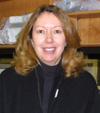Microbiology, Immunology welcomes Sutkowski
by Heather WoolwinePublic Relations
On Jan. 1, the MUSC Department of Microbiology and Immunology welcomed Natalie Sutkowski, Ph.D., assistant professor, as the newest addition to a thriving department.
A northerner by birth and upbringing, Sutkowski developed her interest in microbiology and immunology in Boston, New York and New Jersey before settling in Charleston this month.
 Dr.
Natalie Sutkowski
Dr.
Natalie Sutkowski
“I spent the better part of the last year interviewing all over the country,” Sutkowski said. “And I was able to narrow the choice down to MUSC and UCLA. MUSC was the right choice because the people were so warm and trustworthy.”
Like most academic researchers, Sutkowski expected her career would blossom outside the safety of her “nest” at Tufts University School of Medicine where she completed her postdoctoral work in immunology and virology. “You have to go out and find a department that you can complement,” she said. “MUSC was a great fit because they did not have someone with a research history and background in viral super antigens and immunology.”
Sutkowski not only focuses on those little bugs that cause human illness and how they function, but she wants to know the particulars of how their genetics relate to what they do.
“Right after I received my undergraduate degree from Boston University, I went into the Peace Corps as a biology and chemistry teacher in Ugunja, Kenya,” she said. “I saw so many horrible illnesses and it made me want to learn more about the creatures that caused those diseases. I took an immunology night class at Rutgers (University, and UMDNJ-Robert Wood Medical School, New Brunswick, N.J.) and had a great teacher who got me interested in the body’s response to illness. The next thing I knew, I was studying immunology and getting a Ph.D. in molecular genetics and microbiology.”
A principal investigator for several grant projects at other institutions and a winner of several awards, Sutkowski has two patents related to efficient gene transfer and has authored numerous publications on her given interest.
Although just beginning to get settled in her temporary lab space in the Basic Science Building (she will move to Hollings Cancer Center’s new building upon completion), she already has plans for detailed work here at MUSC.
“Human endogenous retroviruses make up about 8 percent of the human genome so we have viruses that over time, with evolution, have become part of our genetic make-up,” she said. “Most are actually highly defective, but at least one encodes a super antigen that can be turned on by other viruses, like the Epstein-Barr virus (a common herpes virus), and causes immuno-stimulation. Once activated, the super antigen then might contribute to certain kinds of cancer, like lymphomas, or become involved in autoimmune diseases like lupus, multiple sclerosis, and rheumatoid arthritis.”
Sutkowski wants to inhibit this immuno-stimulation caused by the super antigen and discover what effect it has on the Epstein-Barr virus’ ability to cause cancer in a laboratory model.
“MUSC has had one of the largest growth spurts in terms of research dollars; it’s gone from fairly low on the NIH (National Institutes of Health) list to very high and hopefully that will continue to attract people from all over the country to conduct research here,” Sutkowski said. “I’m eager to collaborate with others in my field as well as work with clinicians and specialists here at MUSC, particularly those who specialize in autoimmune diseases and lymphomas.”
And like any new kid on the block, Sutkowski finds the warmth of those in her department and Charleston at large comforting. “I enjoy how friendly people are around here,” she said. “People will just sit and talk to you. In Boston, people are very polite but they are quite reserved. I like it here, I feel supported and I trust those around me.”
To learn more about Sutkowski’s research, contact her at sutkows@musc.edu.
Or visit the Web site at http://www2.musc.edu/MIC/Micro4803/frame_faculty.html.
Friday, Jan. 28, 2005
Catalyst Online is published weekly, updated
as needed and improved from time to time by the MUSC Office of Public Relations
for the faculty, employees and students of the Medical University of South
Carolina. Catalyst Online editor, Kim Draughn, can be reached at 792-4107
or by email, catalyst@musc.edu. Editorial copy can be submitted to Catalyst
Online and to The Catalyst in print by fax, 792-6723, or by email to petersnd@musc.edu
or catalyst@musc.edu. To place an ad in The Catalyst hardcopy, call Community
Press at 849-1778.